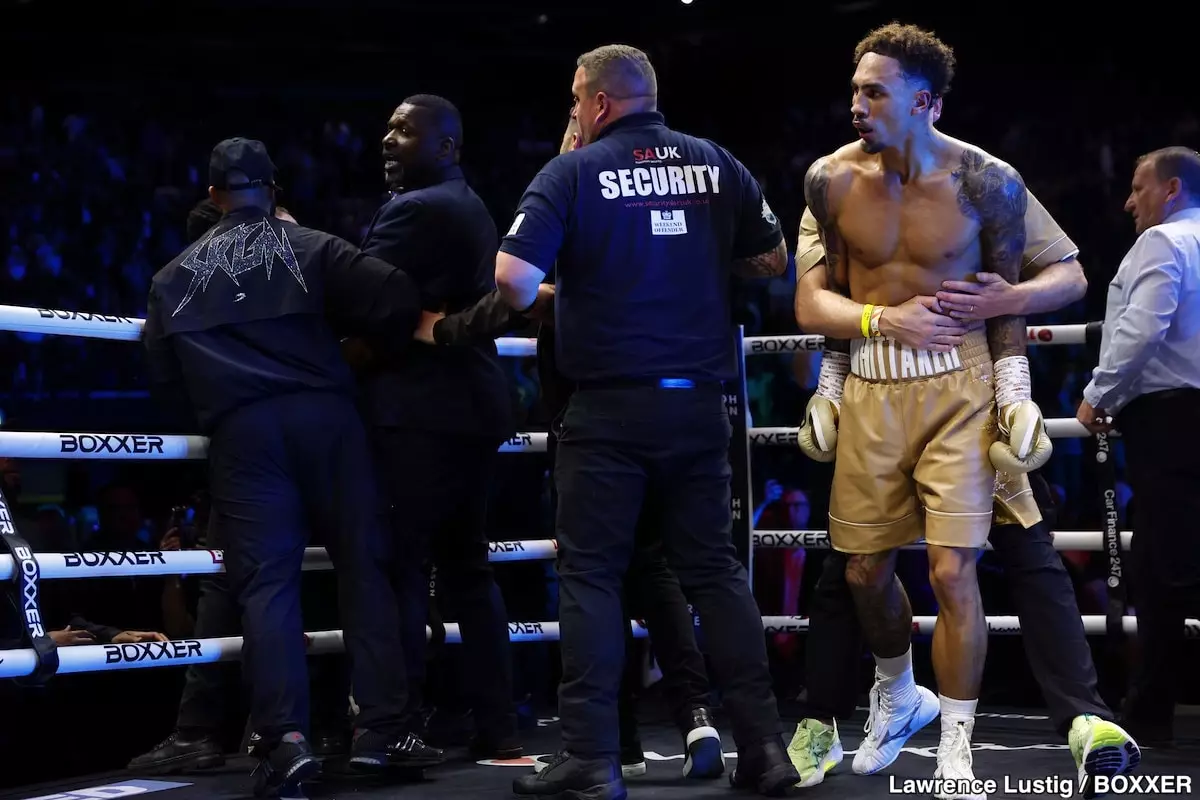Resilience and Opportunity: Liam Cameron’s Remarkable Mindset Post-Fight
In the unpredictable world of boxing, every match is an event where anything can happen. On one particular night, Liam Cameron, a seasoned fighter with a record of 23-7-1, stepped into the ring against Ben Whittaker, an undefeated contender with a 9-0-1 streak. The fight took place at the Resorts World Arena in Birmingham, England, and quickly became the center of attention—not just for the action inside the ring but for what happened outside of it. A controversial decision by referee Howard Foster to stop the fight in the second round sparked debates among fans and analysts, leaving many to wonder if Cameron was denied a fair chance to exhibit his skills.
Boxing fans know that matches can be as unpredictable as they are thrilling. Each punch thrown carries with it a wealth of anticipation and uncertainty. For Cameron, facing an undefeated opponent like Whittaker was no small feat, and many believed he had more to show before the abrupt conclusion. The decision left spectators pondering what could have been had the fight continued. However, Cameron’s reaction to this unexpected turn of events revealed much about his character and mindset.
Key Takeaways
- Liam Cameron displayed resilience in accepting the unexpected stoppage.
- He focused on positive outcomes such as financial gain and future aspirations.
- The event highlighted ongoing debates about refereeing decisions in boxing.
- Cameron’s sportsmanship post-fight earned him respect from fans and peers.
A Fighter’s Perspective
Rather than giving in to frustration over how the fight ended, Cameron showed remarkable composure. His simple yet powerful response, “It is what it is,” embodies the essence of resilience. It illustrates a fighter’s ability to accept what cannot be changed while looking forward to future opportunities. Instead of dwelling on what many perceived as an unfair result, Cameron chose to focus on the positives—most notably, the financial benefits from the bout, which he planned to use toward purchasing a house.
This pragmatic approach not only demonstrates a mature outlook but also highlights his ability to move beyond immediate setbacks. Life in boxing is about more than just wins and losses; it’s about growth and seizing opportunities when they arise. Even in the face of adversity, Cameron’s perspective serves as an inspiring example for others in similar situations. His focus on securing a home symbolizes stability and progress beyond his career in the ring.
The Controversy of Timeliness
The controversy surrounding referee Foster’s decision centers on whether it was premature. Fans and analysts alike debated whether Cameron was still capable of defending himself effectively against Whittaker’s aggressive attacks. Some believed that with more time, Cameron might have leveraged his experience to turn the tide in his favor. This situation raises important questions about when a fighter should be given a chance to rally back from adversity.
Cameron’s acceptance of the referee’s decision—“I can’t complain about it. It’s done”—reflects his understanding of the sport’s nature. Yet it also underscores a potential missed opportunity for him to capitalize on Whittaker’s eagerness. In boxing, timing is everything, and sometimes perseverance can lead to unexpected victories. This incident sparks an ongoing dialogue about how referees balance fighter safety with allowing them the chance to compete.
Reflections on Sportsmanship
The interaction between Cameron and Whittaker after their match demonstrated a level of respect often overshadowed by competition’s intensity. Cameron’s gracious comments toward Whittaker highlighted mutual admiration—a cornerstone of genuine sportsmanship. He acknowledged Whittaker’s efforts by stating, “What a comeback. You just have to give it to him.” Such comments reflect positively on Cameron’s character and set an example for others in the sport.
This mutual respect resonated deeply with fans who appreciate athletes that honor their opponents’ skill and determination. Sportsmanship transcends mere statistics; it speaks volumes about one’s values both inside and outside the ring. By recognizing not only his own journey but also that of his opponent, Cameron showcased humility—a trait that endears athletes to audiences worldwide.
Looking Ahead: Beyond the Ring
Cameron’s aspirations beyond boxing offer insight into his broader goals—like buying a house—a reminder that boxers are individuals with dreams extending past their athletic careers. His intention to invest winnings from this bout into long-term stability reflects foresight often neglected amidst competitive pressures. It paints a picture of someone who values personal growth alongside professional achievements.
While he may not have secured victory that night, Liam Cameron emerged as a winner in other ways through resilience and determination post-fight. His mindset exemplifies how overcoming challenges shapes champions not just within arenas but throughout life itself. It’s these moments—the reactions following triumphs or setbacks—that define true greatness in sports.
Final Thoughts
Liam Cameron’s story is about embracing life’s unpredictability head-on while maintaining focus on what truly matters—growth beyond fleeting victories or losses inside rings around us all day long! His remarkable mindset serves as inspiration across sports communities worldwide encouraging others never lose sight bigger picture amidst everyday challenges face daily basis!
Liam Cameron
boxing resilience
sportsmanship
opportunity


Leave a Reply